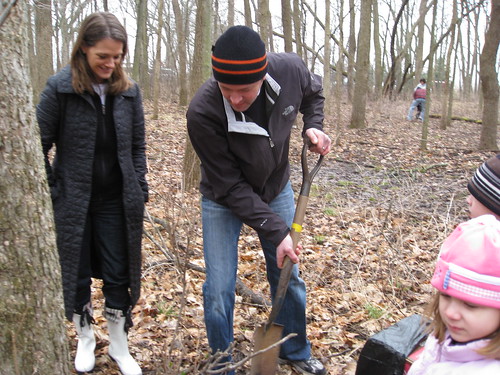About the first thing to arrive in the ground around these parts are ramps, and man about town, David Hammond happened to be there as they sprouted. He contributed a report to WBEZ's 848 on the annual Rampfest at Spence Farm, and he also agreed to write a post for the blog.
Rummaging for Ramps
Ramps are funny vegetables. They’re the first tender premonitions of springtime, delicate, yet resistant to being torn from the still cool earth. As Marty Travis of Spence Farm explained, “You have to get under them,” with a shovel or spade, and work them up gently, or they break and you’re left with a fistful of greens.
Travis is one of the coolest guys I’ve met in a long time. Supplier to Frontera/Topolobampo, Vie and many other higher-end Chicagoland restaurants, Marty is an unassuming man who speaks with simplicity and gentleness that reflects the rolling land of a farm that’s been in his family since 1830.
Every year for the past few, Travis has worked with Terra Brockman of the Land Connection to host a ramp dig, which is now a major attraction among chefs who come to get their hands dirty ripping up ramps and reconnecting with the source of the food they serve their patrons.
After a few hours of ramping, there’s a farm lunch that’s about as wonderful as one could imagine. Some of the area’s most adventurous chefs bring in favorite dishes in an unspoken, gentlemanly competition to shine in a room of some of the brightest culinary minds. From Frontera, there was incredibly tender and subtly piquant roast pork with fresh tortillas; from Vie, full flavored pate, brilliantly crisp housemade pickles and goat butter pound cake. There were many other miraculous contributions, but perhaps the most memorable sensation was the feeling that these chefs were coming together to make great food but also to rediscover and reconnect with the source of that food.
Like I said, ramps are funny. Fresh from the ground, they are almost unpleasantly strong tasting, a kind of vibrant hybrid of garlic and onion, aggressively green. Cut into, say, an egg salad and kept a day, they lose their anger at being ripped out of the earth so young, and gain a subtle tang that makes them a special and pleasing, though transient, taste of spring.
Some pix from the dig, courtesy of the Hat:
Paul and Janet Virant, ramping
Dean Zanella of 312 Chicago, along with a coterie of other ramp-loving chefs, cleaning the leek-like shoots
Goat butter pound cake




